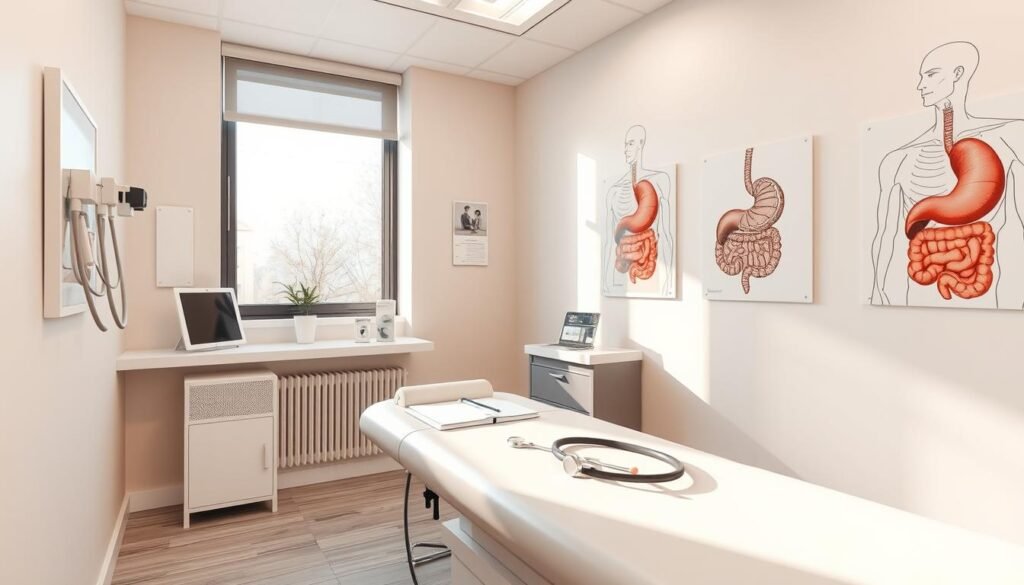Did you know that up to 25% of Americans suffer from abdominal pain? This fact shows how common stomach aches are. Often, these issues are linked to anxiety. Anxiety can show up in physical forms, leading to stomach pain that interrupts everyday life. It can be hard to tell when a stomach ache is just a minor issue or something needing a doctor’s attention. Knowing when to seek help for anxiety-induced stomach pain is key. It helps in managing these symptoms effectively.
Addressing both the physical and emotional sides of chronic stomach issues is vital. If symptoms don’t go away, it might mean you need a doctor’s help. Getting help quickly can lead to better treatment and a happier life.
Key Takeaways
- Abdominal pain affects up to 25% of individuals in the U.S.
- Anxiety can manifest as physical symptoms, including stomach discomfort.
- Distinguishing between temporary discomfort and chronic symptoms is important for health.
- Professional evaluation can help identify underlying issues related to anxiety and stomach pain.
- Timely medical intervention can improve emotional and physical well-being.
Understanding the Connection Between Anxiety and Stomach Pain
Anxiety can deeply affect the body, especially the stomach, due to the brain-gut link. This connection means stress or anxiety can lead to stomach problems. During times of stress, many experience digestive symptoms.
The Brain-Gut Connection
The brain and digestive system are closely linked via the brain-gut axis. When stressed, our bodies release hormones like cortisol. This can increase stomach acid, causing discomfort.
Long-term stress can also make the muscles in the abdomen tight. This leads to stomach pain.
Common Gastrointestinal Symptoms Due to Anxiety
There are many ways anxiety can affect the stomach:
- Indigestion
- Stomach cramps
- Nausea
- Diarrhea
- Constipation
- Loss of appetite
- Bloating
All these symptoms show how much anxiety impacts gut health. Long-lasting anxiety affects your well-being deeply. Knowing about this can help people handle stomach issues from anxiety better.
| Symptom | Description |
|---|---|
| Indigestion | Discomfort in the stomach that may be accompanied by bloating and gas. |
| Stomach cramps | Pain or discomfort that may occur sporadically or continuously in the abdomen. |
| Nausea | A sensation of unease and discomfort in the stomach, often leading to vomiting. |
| Diarrhea | Loose or watery stool, which may occur frequently due to anxiety. |
| Constipation | Difficulties passing stool or infrequent bowel movements. |
| Loss of appetite | A decreased desire to eat, often seen during periods of high stress. |
| Bloating | A feeling of fullness or swelling in the abdomen, often uncomfortable. |
Recognizing Symptoms of Anxiety-Induced Stomach Pain
It’s important to know the signs of anxiety-induced stomach pain to manage it well. This discomfort shows up in different ways, making everyday tasks challenging. Knowing what to look for and how long symptoms last helps tell them apart from other issues.
Common Symptoms Explained
Here are common signs of stomach pain from anxiety:
- Generalized stomach ache
- Severe abdominal pain
- Cramps and bloating
- Nausea and changes in bowel habits
- Increased sensitivity in the stomach area
Stress and anxiety kick off the body’s “fight or flight” mode. This releases hormones that might intensify stomach issues. Many feel different levels of discomfort, from mild nausea to severe cramps, often due to stress.
Understanding the Duration of Symptoms
How long these stomach issues last varies from person to person. They usually last a few hours and are linked to specific things that trigger anxiety. Sometimes, the pain happens when stress or anxiety goes up.
| Severity of Symptoms | Typical Duration | Notes |
|---|---|---|
| Mild Discomfort | 1-3 hours | Linked to situational stress |
| Moderate Pain | 3-24 hours | Requires self-care strategies |
| Severe Symptoms | Beyond 24 hours | Seek medical evaluation immediately |
If your stomach pain lasts more than a day, or if you see blood in your stools or vomit, get medical help. Acting fast helps find the right treatment. For more details on anxiety-linked symptoms, check out this resource.
When to Seek Medical Help for Anxiety-Induced Stomach Pain
Knowing when to get medical help for stomach pain is important, especially with anxiety involved. People often have tummy issues because of anxiety. It’s key to know when to see a doctor.
Signs Indicating Medical Attention is Needed
It’s crucial to talk to a doctor if the symptoms get worse or don’t go away. Look out for:
- Intense abdominal pain that doesn’t get better
- Bloody stools or vomiting
- Unexplained weight loss without trying
- Abdominal discomfort that lasts more than a few hours
These signs could mean serious problems like Crohn’s disease or IBS. You should get checked quickly.
Chronic Symptoms vs. Temporary Discomfort
It helps to know the difference between long-term symptoms and short-term discomfort. Long-term symptoms from anxiety disorders might include:
- Stomach cramps that keep coming back
- Constant indigestion or heartburn
- Regular changes in bowel movements, like diarrhea or constipation
These ongoing issues might be signs of anxiety disorders that affect your health. Temporary discomfort, tied to stress, usually lasts a few hours. It goes away with relaxation or managing your anxiety.

Differentiating between these experiences helps get the right help quickly. It makes sure your mental and physical health are looked after.
The Role of Anxiety Disorders in Stomach Issues
Anxiety disorders have a big impact on physical health, especially the digestive system. Knowing how these disorders affect the body helps people manage their symptoms better. They can also find the right treatment.
How Different Anxiety Disorders Affect the Body
Anxiety disorders like generalized anxiety disorder and panic disorder show up in the body in many ways. They can cause panic attacks, which happen suddenly and can cause stomach problems. Impact of panic attacks can include cramps, nausea, and diarrhea because stress activates the enteric nervous system. Stress from school, work, and relationships often makes these symptoms worse. This leads to a nervous stomach.
Understanding Panic Attacks and Their Impact on Digestion
Panic attacks can mess up digestion quickly, causing a lot of stomach discomfort. They make anxiety levels shoot up, leading to symptoms like belly pain and appetite changes. Also, certain foods—like coffee and chocolate—can make nervous stomach symptoms worse. People with anxiety disorders are much more likely to get stomach issues. Studies show they’re more than twice as likely to get conditions like irritable bowel syndrome (IBS). It’s important for them to look at their diet and try stress relief methods. Methods like meditation or therapy could help. For more on how gastrointestinal symptoms and anxiety are linked, check out this resource: gastrointestinal symptoms and anxiety disorders.

Consulting a Primary Care Physician
When you have stomach pain caused by anxiety, it’s vital to see a primary care doctor. You might need to consult a doctor if symptoms don’t improve or get worse. They check your overall health and figure out the next steps.
Talking openly during your visit is key. Tell them about your symptoms, what causes your anxiety, and your lifestyle. This helps them understand your situation better and create a plan just for you.
Reasons for Seeking Help
- Frequent stomach pain linked to anxiety.
- Symptoms that interfere with daily activities and overall quality of life.
- Persistent gastrointestinal issues, such as bloating or indigestion.
- Need for clarification between anxiety-related symptoms and other possible medical conditions.
- Seeking recommendations for appropriate psychological support.
What to Expect During Your Appointment
At the appointment, the doctor will conduct a detailed check-up. This includes:
- A review of medical history and current symptoms.
- Questions regarding lifestyle factors and stressors.
- Physical examinations focused on the abdomen and gastrointestinal health.
- Possible referrals to specialists for further evaluation, including gastroenterologists or mental health professionals.
In discussing treatment, options like cognitive behavioral therapy or diet changes might come up. Working together with your doctor gives you the best shot at feeling better.

The Importance of a Gastroenterology Evaluation
A gastroenterology evaluation is crucial for diagnosing and treating stomach and gut issues. It’s especially important when stress affects your health. Gastroenterologists are experts in managing conditions treated such as irritable bowel syndrome (IBS), GERD, Crohn’s disease, and ulcerative colitis.
Conditions Treated by Gastroenterologists
Knowing which conditions gastroenterologists treat helps in getting the right treatment. Here are some common issues they deal with:
- Irritable Bowel Syndrome (IBS)
- Gastroesophageal Reflux Disease (GERD)
- Ulcerative Colitis
- Crohn’s Disease
- Constipation and Diarrhea Disorders
If you have symptoms like stomach pain, bloating, bloody stool, or nausea, see a gastroenterologist. Symptoms like major weight loss or diarrhea at night need urgent care.
Possible Diagnostic Tests and Procedures
In a gastroenterology check-up, different diagnostic tests may be done to find the problem. Some common tests include:
| Diagnostic Test | Purpose |
|---|---|
| Endoscopy | Looks at the upper GI tract to check for GERD and ulcers. |
| Colonoscopy | Examines the colon for things like polyps, cancer, or Crohn’s disease. |
| Biopsy | Takes tissue samples to look for diseases or infections. |
| Imaging Studies | Uses X-rays, CT scans, or MRIs to see the GI tract and find problems. |
These tests help make a treatment plan that looks at both the body and mind. They also help us understand how stress can cause gut problems. For more information, check this resource.
Effective Treatments for Anxiety-Induced Stomach Pain
Finding effective treatments for anxiety-induced stomach pain involves a few key steps. Combining cognitive-behavioral therapy (CBT) with lifestyle adjustments can greatly improve symptom management. CBT helps by changing negative thoughts and behaviors, reducing the stomach discomfort anxiety causes.
Cognitive Behavioral Therapy for Managing Anxiety
Cognitive-behavioral therapy is vital for treating anxiety and stomach pain. It provides tools to swap harmful thoughts with positive ones. A solid CBT program improves emotional control and lessens symptoms. Through CBT, people experience less stomach pain and anxiety, gaining resilience and a positive outlook.
Lifestyle Changes to Alleviate Symptoms
Lifestyle adjustments are also key in reducing anxiety-induced stomach pain. Eating right improves gut health, and exercise releases endorphins to ease anxiety. Techniques like yoga, deep breathing, and mindfulness bring relaxation, lessening gut problems. Studies show avoiding caffeine and processed foods helps digestion. Below are the top lifestyle changes:
| Lifestyle Change | Benefits |
|---|---|
| Balanced Diet | Improves gut health and reduces discomfort |
| Regular Exercise | Enhances mood and reduces anxiety |
| Mindfulness Practices | Encourages relaxation and stress relief |
| Avoiding Triggers | Minimizes risk of digestive disturbances |
Self-Management Techniques for Anxiety-Related Stomach Trouble
Managing symptoms linked to anxiety needs a blend of self-care strategies. These aim to curb stress and its effects on the body, especially on the stomach. With mindfulness and careful eating, you can better handle your well-being.
Mindfulness and Stress Reduction Techniques
Being mindful is key to soothing anxiety and fostering peace. Practices like mindful breathing, meditation, and yoga center you in the now. They cut down on stress. Doing these regularly can ease anxiety-related stomach issues.
Stretching and progressive muscle relaxation also help. They ease tension, which boosts both mental and physical health.
Dietary Considerations to Help Calm the Stomach
What you eat affects your anxiety and gut health. Some foods might make anxiety and stomach distress worse. It’s good to avoid processed foods, caffeine, and large meals.
- Bananas
- Rice
- Applesauce
- Toast
- Hydrating fluids like water and herbal teas
Choosing gentle foods can support a calmer gut, reducing stomach pains caused by anxiety. Eating regularly, staying hydrated, and knowing what foods trigger symptoms are key. They improve how you manage anxiety.
Conclusion
Knowing when to get help for anxiety-induced stomach pain is key. The link between anxiety and gut symptoms is strong. This makes it important to take care of both your mind and body.
Seeing a doctor can offer ways to make things better. Treatments could involve therapy and changes in how you live. These methods aim to ease your stomach issues and boost your life quality.
Understanding how anxiety and your body react together is empowering. It allows you to handle anxiety-related stomach pain better. It also highlights the importance of getting medical help to improve your health.